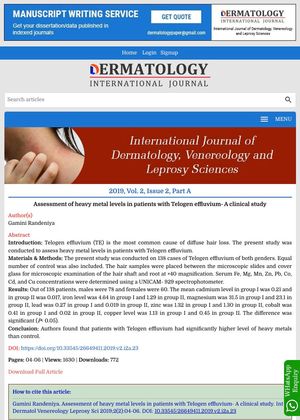TLDR Patients with Telogen effluvium have higher levels of heavy metals than healthy individuals.
In 2019, a study was conducted on 138 patients with Telogen effluvium, a common cause of diffuse hair loss, to assess their heavy metal levels. The study included an equal number of control subjects. The results showed that patients with Telogen effluvium had significantly higher levels of heavy metals than the control group. Specifically, the mean levels of cadmium, iron, magnesium, lead, zinc, cobalt, and copper were all higher in the patient group compared to the control group. For instance, the mean cadmium level was 0.21 in the patient group and 0.017 in the control group, while the mean iron level was 4.64 in the patient group and 1.29 in the control group. The differences were statistically significant.
 6 citations
,
January 2018 in “PubMed”
6 citations
,
January 2018 in “PubMed” Heavy metals might contribute to hair loss in Telogen Effluvium.
 7 citations
,
January 2015 in “Journal of the European Academy of Dermatology and Venereology”
7 citations
,
January 2015 in “Journal of the European Academy of Dermatology and Venereology” Only about 20% of women have hair loss after childbirth severe enough to be considered clinically significant.
 70 citations
,
January 2015 in “Journal of Clinical and Diagnostic Research”
70 citations
,
January 2015 in “Journal of Clinical and Diagnostic Research” Hair loss from Telogen Effluvium usually gets better within 6 months after addressing the cause.
4 citations
,
January 2010 Low levels of certain trace elements might contribute to hair loss in Egyptian women.
 83 citations
,
May 1999 in “International Journal of Dermatology”
83 citations
,
May 1999 in “International Journal of Dermatology” Hair loss that spreads out can often fix itself or be treated by finding and handling the cause.
May 2021 in “Indian journal of forensic medicine and toxicology” Low levels of iron and vitamin D might be linked to chronic hair loss in women.
 December 2020 in “Vestnik dermatologii i venerologii”
December 2020 in “Vestnik dermatologii i venerologii” Iron supplements and physiotherapy together can better treat hair loss in women with iron deficiency.
 1 citations
,
March 2020 in “QJM: An International Journal of Medicine”
1 citations
,
March 2020 in “QJM: An International Journal of Medicine” Lactoferrin levels are lower in people with chronic hair shedding, suggesting supplements could help treat it.
 February 2019 in “Trace elements and electrolytes”
February 2019 in “Trace elements and electrolytes” Women with chronic hair loss had lower levels of zinc, copper, and ferritin than healthy women.
 January 2018 in “International journal of medical biochemistry”
January 2018 in “International journal of medical biochemistry” Women with telogen effluvium have lower levels of iron, folate, and vitamin B12.
 January 2012 in “Yearbook of Dermatology and Dermatologic Surgery”
January 2012 in “Yearbook of Dermatology and Dermatologic Surgery” No significant difference in iron deficiency between women with or without hair loss.

Oral iron therapy may help reduce hair loss in iron-deficient women.
93 citations
,
January 2009 in “PubMed” Low iron levels are linked to hair loss in women.
 83 citations
,
November 2002 in “British Journal of Dermatology”
83 citations
,
November 2002 in “British Journal of Dermatology” Low iron levels are not directly linked to chronic hair loss and iron supplements may not help.
 1 citations
,
January 2002 in “Journal of Clinical Dermatology”
1 citations
,
January 2002 in “Journal of Clinical Dermatology” Low iron levels in the blood may be linked to chronic hair loss in women.












